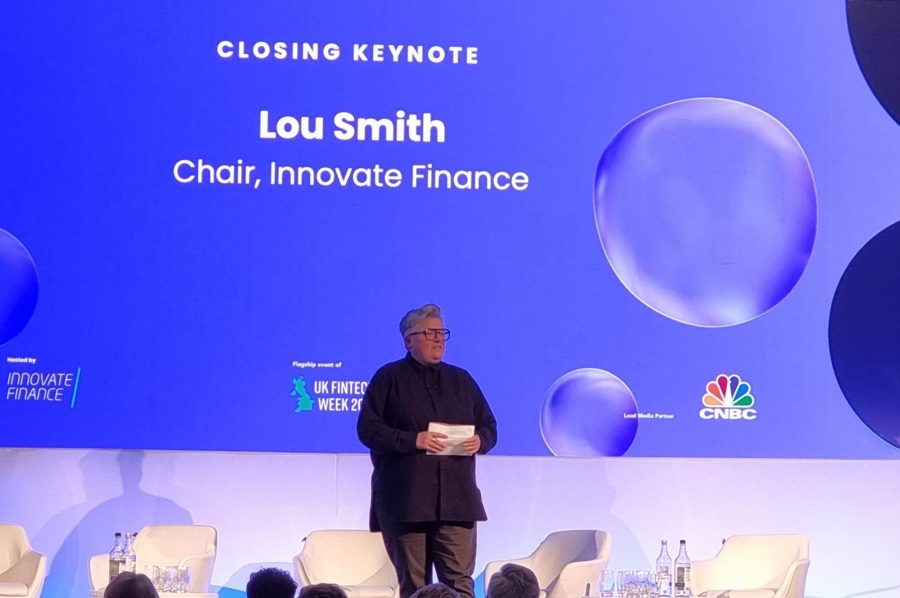From ‘CBDC FOMO’ to crypto regulatory ‘turf battles’, there was lots to mull over during another jam-packed agenda on day two of Innovate Finance Global Summit (IFGS) 2023.
The ninth successive year of IFGS has attracted more than 50 countries and over 1,500 people to the City of London’s historic Guildhall. More than 60 UK exhibitors also demonstrated the latest technologies for the future of finance.
Tuesday served up another eclectic lineup of panels and fireside chats with a focus on crypto, digital assets, CBDCs as well as payments innovation, insurance industry disruption, and industry growth challenges.
Focus on digital identities
Day two in the Old Library kicked off with a keynote speech from Paul Scully MP, Minister for Tech and the Digital Economy, who put the spotlight on successes in fintech and tech for London as well as the rest of the UK. He also outlined the importance of enabling “the widespread use of trusted digital identities across the UK” saying they were “vital to maximise the growth of fintech”.
“It is estimated that savings up to £800million a year can be realised across the UK economy through the widespread use of digital identity,” said Scully. “We have already made fantastic progress in encouraging the adoption of digital identity and with continued contributions to the sector we can achieve further growth in this space.”

Fireside chat with Coinbase
Following from Scully, we enjoyed a fireside chat between Brian Armstrong, CEO of Coinbase, and former chancellor George Osbourne. The pair delved into digital assets, regulation in crypto and decentralised identities.
Armstrong commended the UK on its progress in crypto thanks to “incredible leadership from people like Rishi Sunak” on pushing the importance of science and technology. He also said the fact one regulator, the FCA, oversees everything is beneficial.
“I have to give the UK a lot of credit for that,” he said, while commenting on the crypto “turf battles” in the US between the Commodity Futures Trading Commission (CFTC) and the U.S. Securities and Exchange Commission (SEC) over crypto regulatory supremacy.
“We get contradictory statements from the heads of CFTC and SEC almost every week. How is a business operating in this space able to be clear about the rules?”
CCAF’s fintech map tool

While over in the Livery Hall, Bryan Zhang, co-founder and executive director at Cambridge Centre for Alternative Finance (CCAF), the University of Cambridge Judge Business School, demonstrated the use of a new tool created by CCAF – “A new, interactive digital tool that maps the footprint of UK fintechs”, in the panel ‘Fintech Going Global‘.
“We’re able to compile a fantastic database with 558 UK fintechs, of which 152 are self-reported through the survey and then we open-sourced data from another 406 UK fintechs,” Zhang explained.
Zhang also outlined the aims of the tool and how it could support UK fintechs: “The tool is for fintech founders and CEOs to use this database to design their international strategy. It’s also for them to facilitate conversations with funders and investors and to help them expand into those markets.”
Payments innovations driving financial inclusion and sustainability
Rashee Pandey, head of membership and growth at Innovate Finance, moderated the next Livery Hall panel which focused on the power of payment innovation including the likes of open banking to drive financial inclusion and sustainability.
Dan Graf, CEO at Earthchain, said: “One thing to note is that 99 per cent of British businesses are what you would call SMEs. Those SMEs are responsible for 50 per cent of our carbon emissions which is frightening. And only three per cent of them have actually reported their emissions and set up strategies to do something about it”.
Duncan Cockburn, founder and CEO at OneBanx, discussed financial inclusion: “Open banking to me is much more than just payments. A large part of it is around identity and it encourages third parties to build a relationship with the customer.”
“With cash, the only way in which you can access cash at the moment is by using a chip and pin – that’s the only current valid form of identity in effect. Open banking encourages and enables lots of different forms of authentication”.
Emilian Siemsia, CTO at Planky, explained some of the barriers remaining in the way of open banking enhancing financial inclusion: “According to research at Planky, more than 70 per cent of customers still do not completely trust this technology. The concerns of the customers are around what is happening with the data. So there are still clear issues surrounding transparency, education and trust.”
BNPL regulation
Alex Marsh, head of Klarna UK, discussed the current regulatory proposals on buy now, pay later from the Treasury. He said: “There needs to be a level playing field when it comes to BNPL regulation despite the diversity of products in the industry. The risks with the Treasury’s current proposals is that this does not extend to BNPL arrangements that are provided by retailers directly.
“The current proposals by the Treasury will undermine a lot of efforts of the broad regulation by continuing to drive confusion in consumers who cannot distinguish between BNPL offered directly from retailers, and those offered from a third-party provider.
“Regulatory certainty is helpful for investors looking to invest in fintech. When they know what the rules are, they are more likely to want to push their boundaries and strike for the best outcomes.
“Many policymakers and regulators have never actually used the product, and their decisions are based on what they are reading in the media rather than experiencing it and its benefits. I’d really encourage policy makers to use the product, in order to understand the benefits and value that it can bring to the table.”

Economic environment challenging fintechs
As another panel discussed what today’s economic environment means for fintech, Caroline Vaughan, director of global external affairs at Minna Technologies, explained the trends found in these conditions: “We’ve seen trends around consumers, if you look at subscriptions, ‘hacking the system’ for lack of a better phrase. Consumers really want to manage their money and are getting the providers to do that. So we’ve seen a savviness and this sort of economic environment breeds innovation.”
Vanessa Roberts, head of strategy and responsible business at Leeds Building Society, explained how tough the landscape is currently for first-time buyers in the market:
“One of our purposes is getting home ownership within reach of more people. But actually, it’s really tough to get on the property ladder right now. In fact, it has not been as tough as now to buy a house in the UK since Victorian times.”
Roberts also discussed how Leeds Building Society has had to adapt its strategy in response to tough economic conditions. “We had one particular business line in second homes where we helped people to mortgage second homes. However, we exited that business line because actually that didn’t fit with our purpose and made it harder for first-time buyers – despite the fact that it was very profitable for us,” she explained.
Gone Fishing: The Fintech Talent Search
The Fintech Times‘ own editorial director, Mark Walker, moderated another panel session focusing on the fintech talent search. Claire Tunley, CEO of the Financial Services Skills Commission, discussed the depth of the problem: “There are currently 48,000 vacancies in financial services as a sector. That’s one of the biggest gaps of any sector in the UK. We need to have underpinning skills such as creative thinking, relationship management and teamwork because those are the skills that get the expertise through to products and services.”
“If you can retain your people and build them, then you can really solve some of your recruitment problems,” explained Tunley, “People want to know that they are being treated fairly. They don’t want to be stereotyped or pigeonholed. Therefore, those inclusions really matter because if people don’t like it then they will go. It’s such a hot talent marketplace at the moment that we can’t afford to not think about inclusion”.
Anna Brailsford, CEO and co-founder of Code First Girls, explained the issues that cause so many people to switch careers but highlighted the value of those looking to move into a new career type. She said: “The three biggest career-switching communities are accountants, nurses and teachers.
“When you ask our career-switching population why they want to move they always answer ‘investment in me’ and ‘purpose’. When you pick up a career switcher for your company, the return on investment is absolutely phenomenal. In excess of 50 per cent of the career-switching population have acquired established managerial skills.”

Educating
Jennifer Rigby, director at Mozaic, commented on how the education system in the UK could be adjusted to solve some of our talent issues:
“Regarding the structured education system, most of the visas that we issue are student visas. So in terms of developing and educating people born in this country, but also people attracted to this country by our education system, I think we really need to start joining up some of these things to be developing through the education system as well.”
Are CBDCs a risk or an opportunity?
In an IFGS panel moderated by Dr Ruth Wandhofer, partner at Gauss VC, Gilbert Verdian, founder and CEO of Quant, Marion Laboure, macro strategist at Deutsche Bank and Josh Lipsky, senior director of Atlantic Council, discussed how different forms of digital currencies can live together.
The conversation also turned to competition between central banks.
Lipsky said: “Some people call it CBDC FOMO, which is about ‘what is that other central bank doing and why am I not doing it?’. It isn’t necessarily a bad thing. It is OK for central banks to want to innovate and experiment and try to figure out where the future of money is going.
“But there are some myths about CBDC. One is that they will disintermediate the commercial banking system. The second is that they will cause a bank run but that is why CBDCs are capped.
Ending the Summit

The final words of the Summit went to Lou Smith, chair of Innovate Finance, who hailed the brilliance of industry members.
“We are all fantastic but we are absolutely incredible together. And we have to work together through collaboration if we are to face up to and drive through challenges. We are at such a critical time. It is difficult and it will continue to be difficult, but we have to move forward together, which I know we can.”



